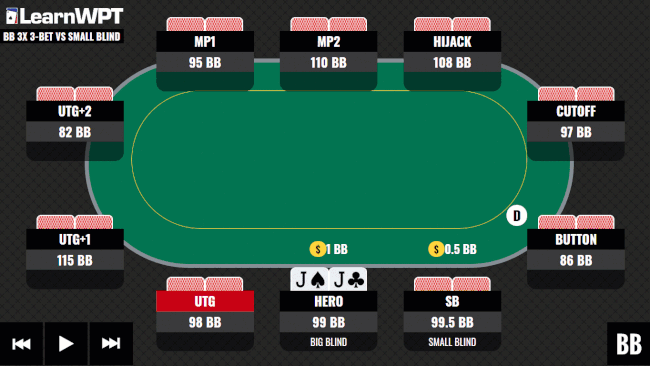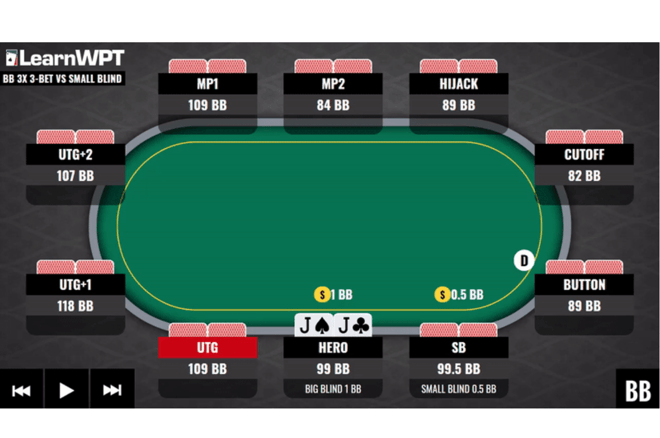Today you’ll be playing a common spot in a cash game where it folds to the Small Blind who raises and you reraise from the Big Blind. Given how wide the Small Blind can open raise in this spot, your reraising range in position should include many premium hands, suited connectors, suited aces, as well as high card offsuit blocker hands such as K5o and Q5o.
The Small Blind will typically check to you and you must decide whether to c-bet and what sizing to use. On dry and static flops with fewer draws present, you can generally use the smaller c-bet size. On more coordinated boards, you can size up to the larger amount when you hold higher equity hands such as overpairs as well as semi-bluffs with backdoor equity. This range will be somewhat more polarized than the range that can use a smaller size. Using the larger size will most effectively deny equity to various hands in the Small Blind’s range.
When holding premium hands such as overpairs along with semi-bluffing hands, it’s crucial to understand the concept of geometric betting. Essentially, geometric betting means that we want to size bets on earlier streets such that we can get all the chips in the middle on the river. Hands like overpairs and big hands like sets should use sizing so that they can stack opponents. However, to stay balanced you must use this sizing with bluffs and semi-bluffs as well.

When faced with a decision of whether to call or fold to an all-in from an opponent, ask yourself the question: Where am I in my range? If your current hand is one of the better hands you can hold in this situation, you should generally continue. If you are in the lower portion of your range, you can usually fold.
Finally, don’t be afraid to size up on your value bets when you hold strong hands. Many players bet too small (hoping to get called) and lose value when they could have gotten additional value from a larger bet.
To access the free five hands, visit this page.
Regular play on the WPT GTO Trainer will help you adjust your decisions closer and closer to GTO strategy.
You don’t have to be the world’s best player to use GTO Strategy, and thanks to the WPT GTO Trainer, now you don’t have to buy expensive software or have expert level knowledge to study GTO.
Why use the WPT GTO Trainer?
The WPT GTO Trainer lets you play real solved hands against a perfect opponent in a wide variety of postflop scenarios for cash game and tournament play.
If your goal is to be a tough poker player then you should try the WPT GTO Trainer today.
[/B]”]Register a free account here (it only takes your e-mail address to begin) to play hands and see true GTO strategy in real-time.
The WPT GTO Trainer has over 4 billion unique solved flops, turns and rivers that are fully playable.
As you make decisions in a hand, you receive instant feedback on the specific EV loss (if any) and Played Percentage for every action you take as compared to GTO strategy.
The full selection of scenarios for the WPT GTO Trainer are only available to members of LearnWPT, however we’re giving PokerNews Readers free access to the Trainer on a regular basis with the WPT GTO Hands of The Week.
Use this series of articles to practice the strategies you learn on LearnWPT (or at the table) and test your progress by playing a five-hand sample each week.
